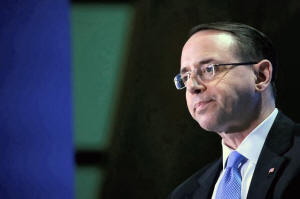|
Trump administration to crack down on
securities, tax fraud
 Send a link to a friend
Send a link to a friend
 [March 03, 2018]
By Lisa Lambert [March 03, 2018]
By Lisa Lambert
(Reuters) - Deputy U.S. Attorney General
Rod Rosenstein on Friday laid out the Trump administration's approach to
fighting financial crime, saying the government will focus more heavily
on certain tax violations and that it is cracking down on securities
fraud.
"We are using data analytics to more quickly identify, investigate and
prosecute manipulation of the securities markets, and other forms of
fraud that threaten the integrity of Americaís financial system,"
Rosenstein said at a conference on white-collar crime in San Diego.
He added the Justice Department is working with the top U.S. markets
regulators to aggressively prosecute manipulation and trading schemes.
Meanwhile, Rosenstein said the government will crack down on those who
fraudulently fail to pay payroll taxes and cost the country tens of
billions of dollars a year.

Rosenstein is mostly known for working with the special investigation
into possible Russian meddling in the 2016 election, after Attorney
General Jeff Sessions recused himself from the case. In his remarks, he
did not directly address the ongoing investigation or President Donald
Trump's ridicule of Sessions this week, but sought to allay concerns
about the department's current state.
"You will not always agree with our policy decisions, and you definitely
wonít hear this on cable TV, but the department leadership team
appointed by President Trump is very strong on ethics and
professionalism," he said.
Rosenstein also worked to reassure corporations, saying he intends to
publish fewer guidance memos than his predecessors and wants "to avoid
imposing penalties that disproportionately punish innocent employees,
shareholders, customers, and other stakeholders."
[to top of second column]
|

Deputy U.S. Attorney General Rod Rosenstein answers questions during
the Financial Services Roundtable spring conference at The Wharf
Intercontinental Hotel in Washington, U.S., February 26, 2018.
REUTERS/Leah Millis

Still, he said the private sector must monitor its own behavior,
explaining that he expects companies to go beyond simply having
policies to comply with the law, and make compliance part of their
corporate cultures.
"If you want us to treat a corporate entity as a victim, you should
act like a victim who wants to see the perpetrators held
accountable," he said.
The department's emphasis on self-reporting and cooperation "has to
be looked at in conjunction with the recent Supreme Court decision
requiring whistleblowers to report directly to the Securities and
Exchange Commission," said John Carney, a former Assistant U.S.
Attorney who is currently co-leader of law firm BakerHostetlerís
white-collar team.
"If the new normal is employees going to the government without you
then corporations need to decide early on whether to fight or to
embrace the DOJís new policies proactively," said Carney, who
attended the speech.
(Reporting by Lisa Lambert in Washington; editing by Grant McCool
and Lisa Shumaker)
[© 2018 Thomson Reuters. All rights
reserved.]
Copyright 2018 Reuters. All rights reserved. This material may not be published,
broadcast, rewritten or redistributed.
Thompson Reuters is solely responsible for this content.
 |